MercoPress. South Atlantic News Agency
Tag: Argentina IMF
-
Monday, July 9th 2018 - 07:08 UTC
“Argentina on the rocky road to recession”, anticipates The Economist
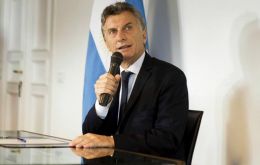
On a residential street corner in Buenos Aires, Van Koning Market sells imported beers to the city’s well-heeled. Since it opened in June last year costs have soared. The peso has plummeted, meaning wholesale prices have shot up. Inflation is running at 26%; the reduction of government subsidies means the monthly electricity bill has risen from 700 pesos to 4,000 pesos (US$ 142).
-
Tuesday, July 3rd 2018 - 07:26 UTC
Argentina plans to free fuel prices starting in August

Argentina will allow fuel retailers to freely set pump prices starting in August, according to an Energy Ministry official familiar with the plan, a move that could encourage badly needed investment in the nation's oil patch but risks worsening sky-high inflation and angering consumers.
-
Tuesday, June 19th 2018 - 08:35 UTC
Argentina shores the Peso, stock market tumbles, ahead of 'Super Tuesday'
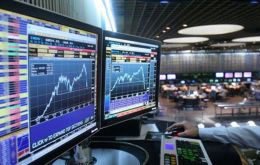
Argentina's peso rose sharply on Monday as a new central bank chief took his first moves to shore up the battered currency, while escalating fears of a damaging trade war between the United States and China drove Latin American stocks down. The Argentine peso jumped after the central bank said it will hike bank's reserve requirements in a move expected to tighten local-currency liquidity after the latest run on the peso.
-
Thursday, June 14th 2018 - 22:14 UTC
IMF's Lagarde welcomes Argentina government’s economic policy plans
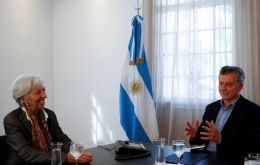
Argentine authorities have asked to use US$7.5 billion of the US$50 billion financing deal signed with the International Monetary Fund to fund their budget, IMF Managing Director Christine Lagarde said in a statement. Argentina’s Finance Ministry said in a separate statement that the funds would be sold on the market through pre-announced daily auctions conducted by the central bank.
-
Thursday, June 14th 2018 - 06:00 UTC
Argentina's unions announce a one-day general strike to protest spending cuts
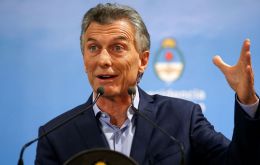
Argentina's leading labor federation announced plans to stage a one-day general strike on June 25 to protest against government economic policies, raising pressure on President Mauricio Macri as he moves to speed up spending cuts to balance the budget.
-
Friday, May 18th 2018 - 07:49 UTC
IMF confirms support for Macri, but also with greater focus on social protection
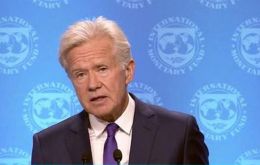
The International Monetary Fund will move quickly to agree on a loan program to support Argentina but there are no details yet on what it will entail, a fund spokesman said on Thursday. However spokesperson Gerry Rice also underlined that the IMF nowadays has a greater focus on social protection, in particular towards the most vulnerable, ensuring the economy and living standards.
-
Friday, April 29th 2016 - 06:08 UTC
IMF praises Argentina's new focus despite an expected contraction of 1% this year
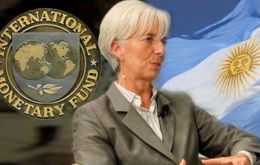
Argentina's GDP is expected to contract by about 1% in 2016, according to the latest IMF Regional Economic Outlook; Western Hemisphere, announced on Wednesday in Mexico. The chapter on Argentina makes a special mention of the new government's changes to remove macroeconomic imbalances.
-
Monday, April 11th 2016 - 05:46 UTC
Argentina ready to formally join the IMF fold; Prat-Gay to meet Lagarde this week
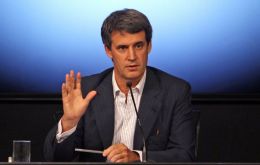
Argentina will start discussions with the International Monetary Fund (IMF) this week on its first Article IV review in a decade, Finance Minister Alfonso Prat Gay said at a conference held by the Institute of International Finance (IIF) in Nassau. “Next week we are going to have a discussion (with the IMF) to agree on an actual schedule for the next Article IV evaluation, which will happen sometime around September,” Prat Gay told the audience on Sunday.
-
Monday, January 25th 2016 - 10:19 UTC
IMF praise for Argentina's measures... but forecasts 'mild recession' this year
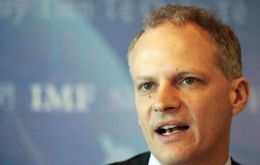
Despite the austerity policies that have been implemented by the government of President Mauricio Macri, Argentina will see a bigger than expected recession this year, the International Monetary Fund (IMF) said in a new report. The economy is set to decline 1% this year, a drop that is 0.3 percentage points larger than the previous forecast that the IMF had released in October.
-
Thursday, January 21st 2016 - 07:33 UTC
Argentine Finance minister expected to meet IMF chief to renew formal ties

Argentine Finance Minister Alfonso Prat-Gay is planning to meet with IMF's Christine Lagarde at the World Economic Forum in Davos, Switzerland, to discuss resuming formal ties with the international lender, according to a report published by Bloomberg.
